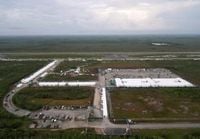In the sweltering heart of the Florida Everglades, a sprawling complex of white tents, chain-link cages, and barbed wire—dubbed “Alligator Alcatraz”—is being emptied, just weeks after opening with great political fanfare. The shutdown, ordered by U.S. District Judge Kathleen Williams on August 27, 2025, has ignited a fierce debate over immigration policy, environmental stewardship, and the staggering cost to Florida taxpayers.
At its core, the story of Alligator Alcatraz is one of rapid ambition colliding with legal and logistical reality. According to Associated Press, Florida poured $218 million into converting the remote Miami-Dade Collier Training and Transition Airport into the detention center, which sits deep within the Big Cypress National Preserve. The site, surrounded by more than five miles of barbed wire, was designed to house up to 3,000 undocumented migrants in rows of bunk beds beneath cavernous white tents. Staffed by 1,000 workers and 400 guards, the facility was intended to be the crown jewel of Governor Ron DeSantis’ aggressive campaign to support President Donald Trump’s nationwide deportation drive.
The speed with which the center was erected was nothing short of breathtaking. In less than two weeks after its announcement, the site was operational by July 3, 2025. Yet, as Bloomberg and First Coast News report, the rush to open Alligator Alcatraz drew immediate lawsuits from environmental groups and the Miccosukee Tribe, as well as protests from civil rights advocates who decried reports of unsanitary conditions and detainees being cut off from legal counsel.
Judge Williams’ ruling was blunt: the state and federal governments failed to conduct the federally required environmental review before building the massive detention facility in sensitive wetlands. In her decision, she stated that the defendants “didn’t follow federal law,” and ordered that the facility be shuttered within 60 days. When the state sought a pause on the order, Williams doubled down, denying the request and setting the stage for an immediate wind down. The state’s top emergency official, Kevin Guthrie, acknowledged in an August 22 email that “we are probably going to be down to 0 individuals within a few days.”
For Florida, the financial consequences are staggering. Not only does the state stand to lose the $218 million invested in the facility’s conversion, but shutting it down—even temporarily—will cost an additional $15 million to $20 million, with another $15 million to $20 million required should the facility ever reopen. An AP analysis revealed that Florida had signed at least $405 million in vendor contracts related to the center, and initial projections pegged annual operating costs at $450 million. As of late July, $245 million had already been allocated to keep the site running.
Despite these mounting expenses, Governor DeSantis and Florida Attorney General James Uthmeier have vowed to fight on. DeSantis, speaking at a press conference after the ruling, insisted, “We have to continue with this mission. It’s important and ultimately it’s going to be good for the state of Florida.” Uthmeier, who first championed the Everglades facility, echoed the governor’s resolve, stating that operations would continue wherever possible.
But the legal and political storm shows no sign of abating. The Department of Homeland Security, while complying with the judge’s order and moving detainees to other facilities, issued a fiery statement to First Coast News: “Under President Trump’s leadership, we are working at turbo speed on cost-effective and innovative ways to deliver on the American people’s mandate for mass deportations of criminal illegal aliens. This activist judge’s order is yet another attempt to prevent the President from fulfilling the American people’s mandate to remove the worst of the worst—including gang members, murderers, pedophiles, terrorists, and rapists—from our country. Not to mention this ruling ignores the fact that this land has already been developed for a decade.” The agency vowed to “continue to fight tooth-and-nail to remove the worst of the worst from American streets.”
The shutdown has drawn sharp criticism from across the political spectrum. State Representative Angie Nixon, a frequent critic of the DeSantis administration, told First Coast News, “They knew that this place was gonna get shut down. They did it anyway and they’re now trying to do the same thing at Baker County and so we should be outraged.” Nixon’s comments reflect growing unease among some Floridians over the state’s willingness to gamble hundreds of millions of taxpayer dollars on legally and ethically fraught projects.
Meanwhile, the human cost of the operation is coming into sharper focus. Maria Garcia, an organizer with the Jacksonville Immigrant Rights Alliance, recounted the story of Diana, a local coffee shop owner detained during a mental health emergency despite legally pursuing immigration status. “She is a valued community member,” Garcia said. “This deportation machine doesn’t just affect faceless, nameless people, they’re part of our community, they contribute, they run businesses, they create economic opportunity.”
Multiple lawsuits are still winding their way through the courts, including claims that detainees at Alligator Alcatraz were denied access to attorneys and suffered inhumane living conditions. Environmentalists, too, remain vigilant. Jessica Namath, who has monitored the facility since its opening, noted that while some tent structures were being dismantled, “it definitely seems like they have been winding down operations.” According to AP, the state allocated $50 million just for portable bathrooms, which have been the subject of repeated complaints about overflowing and unsanitary conditions—allegations the state disputes.
Despite the closure, Florida’s detention ambitions are undimmed. Plans are already underway to open a second facility, the so-called “Deportation Depot,” at the former Baker Correctional Institution in Baker County. DeSantis claims this site will be cheaper and less likely to face environmental hurdles, with an estimated $6 million needed to get it “up and running.” Similar sites are reportedly planned in Indiana and Nebraska, signaling a broader shift toward state-led detention as federal immigration policy continues to roil.
For now, Alligator Alcatraz stands as a cautionary tale: a multimillion-dollar experiment in mass detention, shut down almost as quickly as it sprang up, leaving behind empty tents, legal battles, and a state reckoning with the true cost of its immigration crusade.






